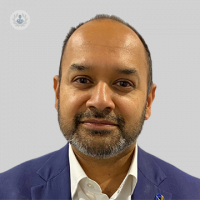The effectiveness of a vasectomy
Written in association with:A vasectomy is a form of male sterilisation that involves cutting or sealing off the vas deferens, which are the tubes that carry sperm out of the testicles to the penis.
Here, Mr Rono Mukherjee, renowned consultant urological surgeon, provides a comprehensive insight into a vasectomy, including its effectiveness, risks and recovery.

What is a vasectomy?
A vasectomy is an operation which renders a man permanently sterile. The procedure is, in fact, the most effective method of male sterilisation.
How is a vasectomy performed?
A vasectomy can be performed under local or general anaesthetic.
The procedure generally involves making two small cuts on the side of the scrotum, for the removal of a small section of the vas deferens from both sides. This removal is then complemented with cauterising of the divided ends, as well as placing some tissue between the two ends to prevent them from re-joining (something called fascial interposition).
What are the risks and complications of a vasectomy?
I tend to divide the risks and complications into standard generic complications and complications that are specific to the operation itself.
Standard complications include:
- Infection (wound, testicle)
- Bleeding and bruising
- Haematoma (blood clot) formation: Sometimes, a scrotal exploration is required for the removal of a blood clot.
- Postoperative pain: Painkillers are prescribed on a regular basis for a few days to keep the pain under control.
To help prevent excessive pain and bleeding, we ask patients to defer heavy lifting, gym work, training, gardening, etc after the vasectomy.
Specific complications include:
- Chronic pain or discomfort: Occurs in 1-5 per cent of all patients. The pain is classically described as an aching discomfort, intermittently associated with the scrotum, that only came about after the vasectomy. Rarely - in less than one per cent of all patients - the pain is so severe that we must consider a vasectomy reversal.
- Sperm granuloma (a small palpable lump at the cut end of the vas deferens): If patients feel a lump in the testicle and they aren’t sure about what it is, it’s important to get checked out by a GP or a urologist.
How effective is a vasectomy?
There is an early failure rate and a late failure rate associated.
Early failure rate
In an early failure rate, the patient needs to continue using contraception until their semen is clear of sperm. This normally occurs after 24 ejaculations (16 weeks). So, the vasectomy is really not finished until the patient has handed in a post-operative semen sample, and that semen sample is free of sperm.
The first post-operative semen sample is done at 16 weeks. At this mark, the semen sample should be clear of sperm.
- If sperm is seen, then the patient needs to continue using contraception for another three months.
The second post-operative semen sample is done at seven months.
- If minimal (less than 100,000 sperm by millilitres) non-motile sperm is seen, then we give something called special clearance to discontinue contraception, because this sperm is likely to not be viable at all and the likelihood of a partner's pregnancy is slim.
- If persistent motile sperm is seen, then we offer a re-do vasectomy. This is seen in 1 in 250 of all patients.
The instructions for the post-operative semen sample(s) - including how, where, and when to hand the sample(s) in - are given to patients after the vasectomy.
Late failure rate
In a late failure rate, the vasectomy has been successful, with an initial negative sperm count. However, the ends of the vas deferens have re-joined and re-canalysed, resulting in fertility and a partner's pregnancy at a later stage. This is rare, only occurring in 1 in 2,400 of all patients, but it does occur.
A vasectomy, however, is the most effective method of male sterilisation.
What is recovery like after a vasectomy?
With local anaesthetic, there’s no general anaesthetic to recover from. With general anaesthetic, it can take a few hours to recover, and patients will generally feel sore.
Often, vasectomy is performed in younger patients, and we always advise against doing anything that causes straining or that increases the risk of bleeding and blood clot formation. Thus, for the first few weeks, it is advised not to do anything heavy in terms of lifting, gardening, cycling, gym work, training, playing football, etc.
In terms of returning to work, this depends on what patients do for a living. If patients are able to make themselves desk-bound at work and not do anything too strenuous, then this is preferred.
In terms of driving, patients should always check with their motor insurance. Sometimes, insurance companies have a list of procedures and a definite time, but most often insurances follow the medical advice, which is always when patients feel comfortable enough to make an emergency stop.
If you require a vasectomy, don't hesitate to book an appointment with Mr Rono Mukherjee via his Top Doctors profile today.


